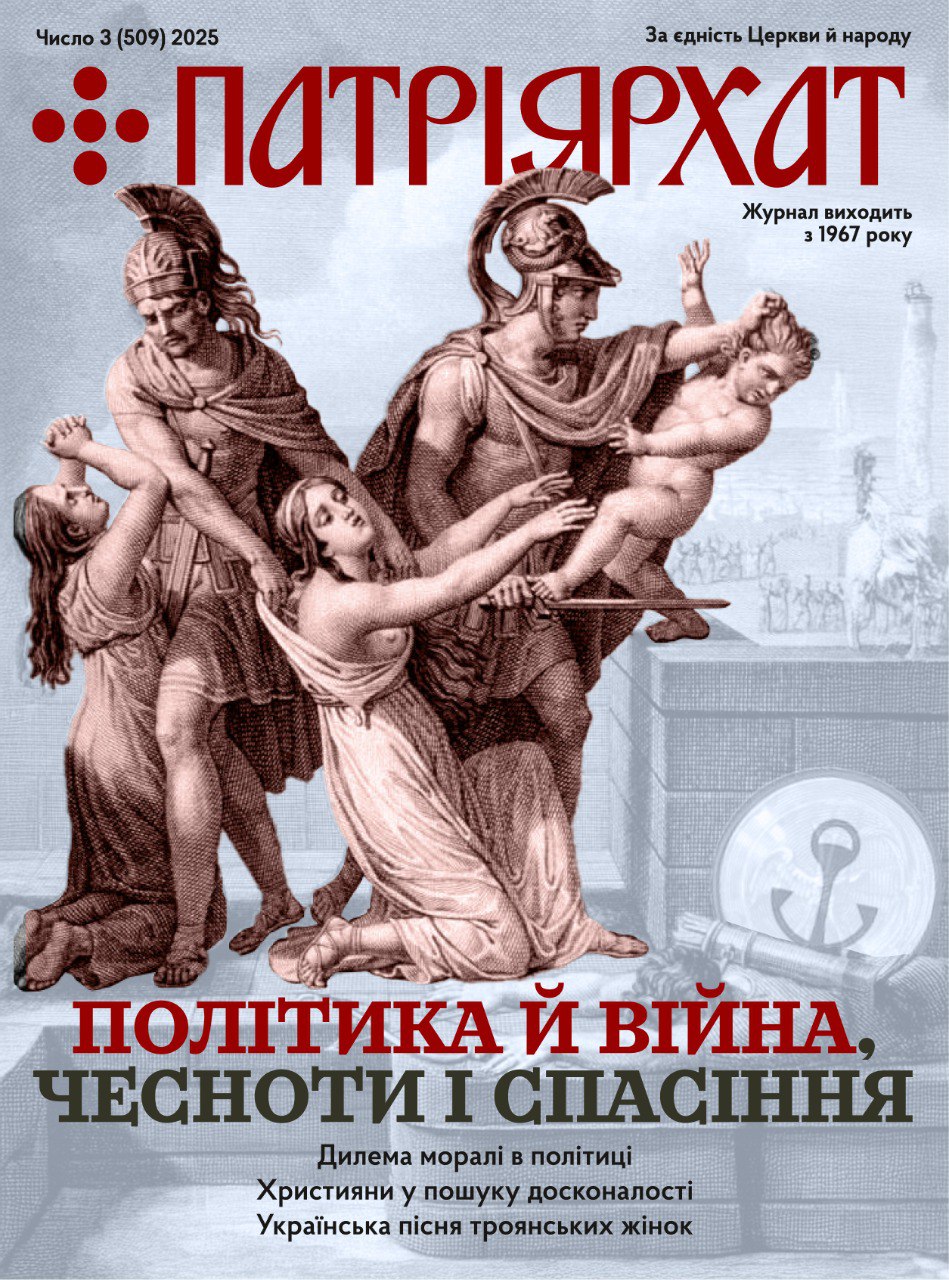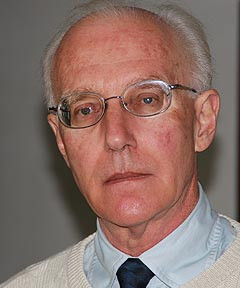Dr Andrew SOROKOWSKY
Pope Francis’ Apostolic Exhortation “Gaudete et Exsultate: On the Call to Holiness in Today’s World” (19 March 2018) is addressed to all of us. Its purpose is “to re-propose the call to holiness in a practical way for our own time” (no. 2). Francis emphasizes that the call to holiness is for everyone. And while an apostolic exhortation does not have the dogmatic, defining quality of an encyclical, Francis’ intent here is not to define doctrine. Rather, it is to exhort us – to encourage each of us to aspire to holiness.
Pope Francis’ thinking has been described as typically Jesuit. Ukrainians have a negative historical memory of the Jesuits, whom they associate with centuries of Polish Roman Catholic colonization. But “jesuitical” casuistry was in fact a flexible and perhaps humane approach to moral and ethical problems, taking each case individually rather than imposing strict rules with unbending uniformity. In any case, according to one observer, a mark of Pope Francis’s thinking is that he favors practical discernment of situations over statements of abstract concepts – he has a “preference for situations over ideas.”[1]
The exhortation is long (177 sections), but I would encourage everyone to read it in full. It might be best to take each of its five chapters separately. Chapter One, “The Call to Holiness,” introduces the subject. Chapter Two, “Two Subtle Enemies of Holiness,” discusses Gnosticism and Pelagianism – ancient heresies that represent two common and persistent errors in the human quest for salvation. Indeed, both are in full evidence today. Chapter Three, “In the Light of the Master,” discusses the Beatitudes (Matthew 5:3-11), the first part of the Sermon on the Mount (Matthew 5-7), which for Pope Francis are the core of the Christian message (nos. 65-94). Indeed, the title of the exhortation, “Rejoice and be Glad,” comes from the conclusion to the Beatitudes (Matthew 5:12). Francis focuses next on the conclusion of Jesus’ Olivet Discourse (Matthew 25:31-46), which he terms “the Great Criterion” (no. 95-99). This leads to a brief discussion of two false ideologies of our time regarding social engagement, one of which over-emphasizes it, while the other neglects it (nos. 100-103). In Chapter Four, “Signs of Holiness in Today’s World,” Pope Francis comments on five expressions of the love of God. Finally, in Chapter Five, he discusses “Spiritual Combat, Vigilance, and Discernment.”
While every human being should find this exhortation of relevance to his life, several passages seem particularly relevant to Ukraine and Ukrainians. One in particular is striking. In Chapter Three, discussing the Beatitudes, Francis says:
In living the Gospel, we cannot expect that everything will be easy, for the thirst for power and worldly interests often stands in our way. Saint John Paul II noted that “a society is alienated if its forms of social organization, production and consumption make it more difficult to offer this gift of self and to establish this solidarity between people.” In such a society, politics, mass communications, and economic, cultural and even religious institutions become so entangled as to become an obstacle to authentic human and social development. As a result, the Beatitudes are not easy to live out; any attempt to do so will be viewed negatively, regarded with suspicion, and met with ridicule. (no. 91)
The quotation from Saint John Paul II refers to his encyclical Centesimus Annus at no. 41 (cited in note 78 of the exhortation). The Polish pope’s encyclical was issued in 1991, the hundredth anniversary of Pope Leo XIII’s encyclical Rerum novarum (the first of the great modern papal documents on the social doctrine of the Church[2]) and, as it turned out several months later, the year of the collapse of the USSR.
In the passage from which the quote is taken, St. Pope John Paul II discusses the concept of “alienation” as a reversal of means and ends. Alienation is a result of an inability to find one’s true nature as a human being created in the image of God. Only by discovering this true nature can one transcend oneself, making a “free gift of self” to others. It is the inability to make this gift that causes alienation in the individual. The same, he continues, applies to society. Thus, an alienated society is one that cannot create solidarity through the “free gift of self.”
Is Ukrainian society “alienated”? Do its “forms of social organization, production and consumption” prevent it from establishing social solidarity? Do its “politics, mass communications, and economic, cultural and even religious institutions,” in Pope Francis’ words, form a tangled “obstacle to authentic human and social development”?
There is evidence that they do. While a full discussion would require a monograph, for our purposes four brief examples, chosen almost at random, should suffice. They come from the fields of agriculture, labor, ecology, and culture.
Agriculture is an area where the forms of production and consumption are changing radically. The traditional Ukrainian rural way of life, based on the village economy, was disrupted first by the imposition of serfdom, then, under the Soviet regime, by collectivization and forced famine. In western Ukraine, small farming survived through the organization of cooperatives, until postwar Soviet rule destroyed that system too. Today, circumstances often compel small farmers to sell their land to enormous multinational agribusinesses in return for supposedly steady wage labor, which turns them into employees rather than proprietors and producers. Moreover, these new latifundias often produce crops not for Ukraine, but for export, while the profits chiefly benefit not the producers, but international shareholders. Thus, the system of small farmers producing for their families and for the local market – a system which builds social solidarity – is destroyed.
Many villagers, unable to compete with agribusiness, go abroad as guest workers. Here again, the traditional forms of social organization and production are disrupted. Husbands and sons leave to labor in agriculture or industry, wives and daughters to work as domestics or caregivers, in places like Italy, Portugal, or France; children are often left with only one parent or neither. The family, the community, the society itself is disrupted. People become “trans-national,” without firm roots in either their country of birth or their country of employment; many, indeed, remain in illegal status. Under such conditions, there can be no social solidarity, no “authentic human and social development.”
Meanwhile, the natural resources of Ukraine fall prey to oligarchs who use political levers to extract economic gains, often illegally. Thus, the Carpathian Mountains have been denuded of a considerable portion of their forests. The degradation of the environment prevents authentic human development because man is called to live in harmony with God’s creation, exerting stewardship over natural resources and sharing them with others, rather than exploiting them in an unsustainable manner for private profit.
Ukraine has attracted international attention in its attempts to counter Russian influence in mass communications and “popular” culture. The problem, however, is broader than that. Church leaders have long noted the negative moral effects of Western as well as Russian entertainment products – to call them “culture” would hardly be appropriate – on the general public and on youth in particular. Meanwhile, the native film industry, for example, languishes. Liberal cultural and media policies threaten authentic human and social development because they effectively favor well-funded “entertainment industries,” which specialize in violent and sexually exploitative products, over genuine art and culture.
Can the church do anything to overcome the resultant alienation of individuals and society itself, to re-establish social solidarity and authentic human development? This is not the place to provide more than a hint of an answer in the four problem areas we have cited. In agriculture, for example, foreign investment could be beneficial. But laws and policies that protect the small farmer as well as the village community should be designed and implemented. In labor, radical economic reform is needed to provide jobs at a family wage for Ukraine’s workers, removing the temptation to seek higher wages abroad. Effective enforcement of environmental regulations – admittedly easier said than done – is a matter of national economic as well as social survival. In the area of mass media, various tax, tariff, and other legal and economic tools could restrict the import of morally toxic entertainment products, while affirmative policies could foster the growth and development of authentic culture. These answers are not, of course, sufficiently specific or complete, and they may be altogether wrong. The point, however, is that answers can be fashioned and put into practice – not by the church hierarchy or clergy, of course, but by the broader church in the full sense – that is, by an active and engaged laity.
Of course, such answers inevitably call forth the objection that in Ukraine’s present condition, defending itself from foreign aggression while remaining in the grip of a rapacious oligarchy with no concept of the common good, they are simply unrealistic. Certainly, this author, as a citizen and resident of the United States, is in no position to judge their likelihood of success. But the point is that all such initiatives – political, legislative, economic — are the task of the Catholic laity — not just as Ukrainian citizens who happen to worship in a Catholic church, but as Catholics who seek holiness through social action as well as personal sanctification. For it is a false though common idea that separation of church from state means that the church, as the entire body of believers, cannot take positions on public affairs, or that its workaday civic and economic life is separate from its faith. Pope Francis emphasizes that faith without practical action is not true holiness. Catholic faith, as reflected in the Beatitudes, must inform the laity’s civic, political, economic, social and cultural activity.
Centered on the Beatitudes, holiness as described by Pope Francis requires social as well as personal transformation. This transformation is akin to the metanoia of the Byzantine tradition, but applied to society as a whole. It cannot happen by words, thoughts, or ideas alone. It requires action.
[1] Andrew M. Haines, Talking with Jesuits, Ethika/Politika, June 7, 2018). https://ethikapolitika.org/2018/06/07/talking-with-jesuits
[2] For a commentary on Centesimus Annus, see Thomas Storck, An Economics of Justice and Charity: Catholic Social Teaching, Its Development and Contemporary Relevance, Kettering, Ohio, 2017, chapter five and appendix II).
This article represents the opinions of the author and not necessarily those of the editors of “Patriyarkhat”

